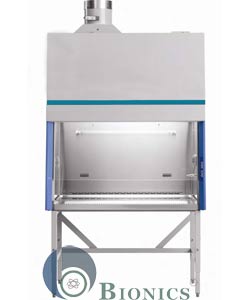The Qualities of an Ideal microbiological safety cabinet
The Qualities of an Ideal microbiological safety cabinet
Blog Article
Enhancing Laboratory Safety with Class 2 Biosafety Cabinets and Microbiological Protection

Modern laboratories prioritise safety for workers, materials, and environments. Whether it's conducting biological tests, diagnostics, or experiments with infectious agents, biosafety cabinets play an integral role in contamination prevention and sample integrity.
Among the available options, Class 2 Biosafety Cabinets stand out for their balanced protection. These units are indispensable tools for pathogen handling and biological research.
Biosafety Cabinets – How They Work and Why They Matter
Biosafety cabinets are specially designed, enclosed systems that ventilate and filter lab air. They use advanced filters to trap harmful particles before air re-enters the lab.
These units are generally classified into three categories—Class I, Class II, and Class III. Among these, Class II units strike a balance between user, product, and environmental protection.
Why Class II Cabinets Are the Preferred Choice in Labs
Class 2 Biosafety Cabinets are designed to safeguard three aspects: the operator, the sample, and the environment. They generate a vertical airflow that reduces turbulence and contamination.
Air is treated using dual filtration systems to ensure safe circulation and exhaust. These cabinets are frequently used in labs handling infectious agents or clinical samples.
What Makes Class 2 Cabinets Effective in Labs
A Class 2 microbiological safety cabinet includes several integrated safety mechanisms such as:
• Medical-grade filters for capturing contaminants
• Steady air movement to reduce airborne particle circulation
• Pressure differentials that maintain internal containment
• Optional UV lights for overnight sterilisation
• Low sound emissions to reduce fatigue
• Clear front panel for visibility and safety
These elements ensure safety, comfort, and efficiency in day-to-day lab tasks.
Applications in Research and Healthcare
Class 2 Biosafety Cabinets are key equipment in healthcare, molecular biology, and quality control. They are indispensable for handling clinical specimens, blood cultures, and biological reagents.
From universities to private pathology labs, Class 2 cabinets ensure lab hygiene and sample integrity.
Benefits of Using Class 2 Biosafety Cabinets
Using Class 2 cabinets offers multiple advantages including operator protection and experimental reliability:
• Protects the integrity of lab work
• Shields operators from harmful aerosols and pathogens
• Minimises lab contamination and pollution risks
These cabinets combine safety features with operational efficiency.
Regulatory Standards for Class 2 Cabinets
Top manufacturers design units compliant with major biosafety regulations worldwide. Class 2 units are sub-classified as A1, A2, B1, and B2—based on varying airflow balance and ducting needs.
• Type A2: Ideal for general-purpose labs
• Type B2: Exhausts 100% of air via ducting; no recirculation
Matching the cabinet type to your process is essential.
Choosing the Right Biosafety Cabinet
Before purchasing, consider:
• The biosafety level required (BSL-1, BSL-2, or BSL-3)
• Cabinet dimensions, ducting needs, and room layout
• Operational costs and technical support options
• Service network and part availability
Working with reliable manufacturers provides peace of mind and technical guidance.
Best Practices for Using Class II Biosafety Cabinets
For optimal results:
• Install the cabinet in a draft-free, low-traffic zone
• Get periodic validation from certified technicians
• Train users in proper techniques and precautions
Operational best practices include:
• Always Biosafety Cabinets wear appropriate lab PPE
• Avoid sudden or quick arm movements
• Clean all contact points post-operation
• Treat UV usage as an overnight sterilisation method
Why Class 2 Cabinets Are a Must-Have in Labs
Class 2 biosafety cabinets are essential for labs that value safety, precision, and cleanliness. They safeguard both research outcomes and operator health.
From pathology labs to advanced genetic testing, Class II cabinets copyright the highest biosafety levels. When investing in a biosafety cabinet, choose performance and reliability over cost-cutting—because lab safety is non-negotiable. Report this page